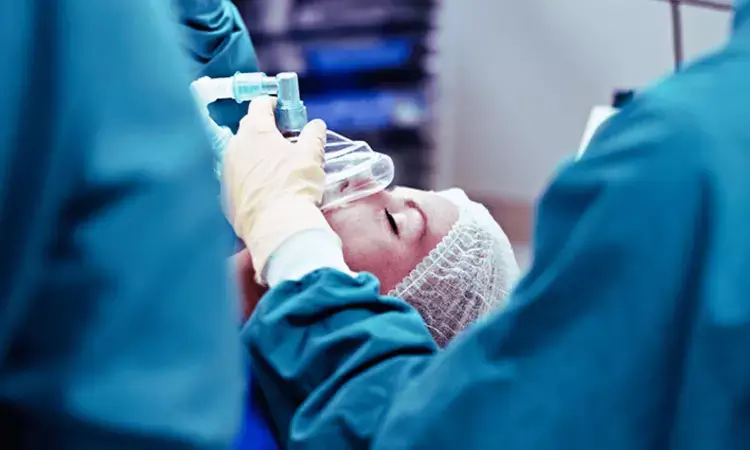- Home
- Medical news & Guidelines
- Anesthesiology
- Cardiology and CTVS
- Critical Care
- Dentistry
- Dermatology
- Diabetes and Endocrinology
- ENT
- Gastroenterology
- Medicine
- Nephrology
- Neurology
- Obstretics-Gynaecology
- Oncology
- Ophthalmology
- Orthopaedics
- Pediatrics-Neonatology
- Psychiatry
- Pulmonology
- Radiology
- Surgery
- Urology
- Laboratory Medicine
- Diet
- Nursing
- Paramedical
- Physiotherapy
- Health news
- Fact Check
- Bone Health Fact Check
- Brain Health Fact Check
- Cancer Related Fact Check
- Child Care Fact Check
- Dental and oral health fact check
- Diabetes and metabolic health fact check
- Diet and Nutrition Fact Check
- Eye and ENT Care Fact Check
- Fitness fact check
- Gut health fact check
- Heart health fact check
- Kidney health fact check
- Medical education fact check
- Men's health fact check
- Respiratory fact check
- Skin and hair care fact check
- Vaccine and Immunization fact check
- Women's health fact check
- AYUSH
- State News
- Andaman and Nicobar Islands
- Andhra Pradesh
- Arunachal Pradesh
- Assam
- Bihar
- Chandigarh
- Chattisgarh
- Dadra and Nagar Haveli
- Daman and Diu
- Delhi
- Goa
- Gujarat
- Haryana
- Himachal Pradesh
- Jammu & Kashmir
- Jharkhand
- Karnataka
- Kerala
- Ladakh
- Lakshadweep
- Madhya Pradesh
- Maharashtra
- Manipur
- Meghalaya
- Mizoram
- Nagaland
- Odisha
- Puducherry
- Punjab
- Rajasthan
- Sikkim
- Tamil Nadu
- Telangana
- Tripura
- Uttar Pradesh
- Uttrakhand
- West Bengal
- Medical Education
- Industry
Semirecumbent Positioning in Anesthesia Recovery Reduces Postoperative Hypoxemia Risk: JAMA

Tumakuru’s Rising C-Sections Spark Ministerial Outrage
China: A recent randomized clinical trial has uncovered a potentially transformative approach to reducing postoperative hypoxemia by advocating for semirecumbent positioning during anesthesia recovery. The study, conducted by a team of anesthesiologists and critical care specialists, highlights a simple yet effective intervention that could significantly improve patient outcomes following surgery.
The randomized clinical trial that included 700 adults undergoing laparoscopic upper abdominal surgery (LUAS) revealed that a 30° semirecumbent position during recovery from anesthesia may help prevent the development of postoperative hypoxemia.
"A 30° semirecumbent position during recovery from anesthesia lowered the incidence of postoperative hypoxemia from 47% in a supine position to 32%," the researchers reported in JAMA Network Open.
Postoperative hypoxemia, characterized by low oxygen levels in the blood after surgery, is a common and concerning complication that can lead to respiratory distress and prolonged hospital stays. Traditional recovery practices often involve patients lying flat, which may contribute to impaired lung function and exacerbate oxygenation issues.
Despite the widespread use of a semirecumbent position (SRP) in reducing postoperative hypoxemia during anesthesia emergence, there is no clarity on its efficacy. Considering this, Xinghe Wang, Jiangsu Province Key Laboratory of Anesthesiology, Xuzhou Medical University, Xuzhou, China, and colleagues aimed to determine the differences in postoperative hypoxemia between patients in an SRP and a supine position.
For this purpose, the researchers performed a randomized clinical trial at a tertiary hospital in China between 2021 and 2022. It enrolled patients scheduled to undergo laparoscopic upper abdominal surgery under general anesthesia. Study recruitment and follow-up are complete.
Patients were randomized to one of the following positions at the operation's end until leaving the post-anesthesia care unit: supine (group S), 15° SRP (group F), or 30° SRP (group T).
The primary outcome was the postoperative hypoxemia incidence in the post-anesthesia care unit. Severe hypoxemia was also evaluated.
The study led to the following findings:
- Out of 700 patients (52.0% men; mean age, 47.8 years), 233 were randomized to group S (54.1% men; mean age, 48.2 years), 233 to group F (52.4% men; mean age, 48.1 years), and 234 to group T (50.4% women; mean age, 47.2 years).
- Postoperative hypoxemia differed significantly among the three groups (group S, 46.8%; group F, 45.1%; group T, 32.5%). This difference was statistically significant for groups T versus S (risk ratio [RR], 0.69) and groups T vs F (RR, 0.72), but not for groups F versus S (RR, 0.96).
- Severe hypoxemia also differed among the three groups (group S, 26.2%; group F, 22.7%; group T, 15.4%). This difference was statistically significant for groups T vs S (RR, 0.59).
The findings showed that using a 30-degree SRP during anesthesia emergence notably decreased the incidence of postoperative hypoxemia in patients undergoing LUAS compared to those in the supine position. Additionally, it shortened the duration of stay in the post-anesthesia care unit (PACU), led to fewer instances of airway rescue and coughing, and improved overall PACU operational efficiency.
Reference:
Wang X, Guo K, Sun J, et al. Semirecumbent Positioning During Anesthesia Recovery and Postoperative Hypoxemia: A Randomized Clinical Trial. JAMA Netw Open. 2024;7(6):e2416797. doi:10.1001/jamanetworkopen.2024.16797
Dr Kamal Kant Kohli-MBBS, DTCD- a chest specialist with more than 30 years of practice and a flair for writing clinical articles, Dr Kamal Kant Kohli joined Medical Dialogues as a Chief Editor of Medical News. Besides writing articles, as an editor, he proofreads and verifies all the medical content published on Medical Dialogues including those coming from journals, studies,medical conferences,guidelines etc. Email: drkohli@medicaldialogues.in. Contact no. 011-43720751


